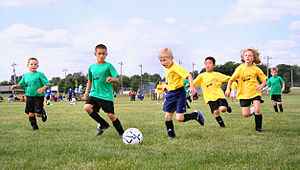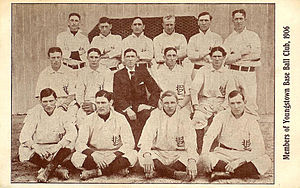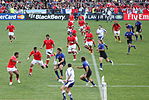Portal:Sports
The Sports Portal

Sport is a form of physical activity or game. Often competitive and organized, sports use, maintain, or improve physical ability and skills. They also provide enjoyment to participants and, in some cases, entertainment to spectators. Many sports exist, with different participant numbers, some are done by a single person with others being done by hundreds. Most sports take place either in teams or competing as individuals. Some sports allow a "tie" or "draw", in which there is no single winner; others provide tie-breaking methods to ensure one winner. A number of contests may be arranged in a tournament format, producing a champion. Many sports leagues make an annual champion by arranging games in a regular sports season, followed in some cases by playoffs.
Sport is generally recognised as system of activities based in physical athleticism or physical dexterity, with major competitions admitting only sports meeting this definition. Some organisations, such as the Council of Europe, preclude activities without any physical element from classification as sports. However, a number of competitive, but non-physical, activities claim recognition as mind sports. The International Olympic Committee who oversee the Olympic Games recognises both chess and bridge as sports. SportAccord, the international sports federation association, recognises five non-physical sports: bridge, chess, draughts, Go and xiangqi. However, they limit the number of mind games which can be admitted as sports. Sport is usually governed by a set of rules or customs, which serve to ensure fair competition. Winning can be determined by physical events such as scoring goals or crossing a line first. It can also be determined by judges who are scoring elements of the sporting performance, including objective or subjective measures such as technical performance or artistic impression. (Full article...)
Selected articles
Selected pictures
Did you know...
- ...that English lower-league football team Bristol Rovers once beat the Netherlands national football team 3-2?
- ...that 2012 Australian Paralympic wheelchair basketball player Jannik Blair (pictured) has a partial wheelchair basketball scholarship from the University of Missouri?
- ...that Kanken Toyama, who developed the Shūdōkan school of karate, was originally an elementary school teacher?
- ...that the breeding rights for the Thoroughbred racehorse Graustark sold for a record US$2,400,000?
- ...that the 1989 Glasnost Bowl was an attempt to schedule an American college football game in the Soviet Union?
Selected quote
Selected athlete
Her successful amateur career included a win in the St. Rule Trophy played at St. Andrews and a runner-up finish in the Swedish national mother/daughter golf tournament. She moved to the United States to attend college at the University of Arizona. She won seven collegiate titles and in 1991, became the first non-American and first freshman to win the individual NCAA Division I Championship. She was 1991 NCAA Co-Player of the Year with Kelly Robbins, runner-up in the 1992 NCAA National Championship, 1992 Pac-10 champion and a 1991-92 NCAA All-American.
The winner of a record eight Player of the Year awards and six Vare Trophies, given to the LPGA player with the lowest seasonal scoring average; she is the only female golfer to have shot a 59 in competition. She holds various all-time scoring records including the lowest season scoring average: 68.6969 in 2004. Representing Europe in the Solheim Cup on eight occasions between 1994–2007, Sörenstam was the event's all-time leading points earner until her record was surpassed by England's Laura Davies during the 2011 Solheim Cup. (Full article...)
Selected team
The governing body, the Welsh Rugby Union (WRU), was established in 1881, the same year that Wales played their first international against England. Wales' performances in the Home Nations Championship (now the Six Nations) continued to improve, experiencing their first 'golden age' between 1900 and 1911. They first played New Zealand, known as the All Blacks, in 1905, when they defeated them 3–0 in a famous match at Cardiff Arms Park. Welsh rugby struggled between the first and second World Wars, but experienced a second 'golden age' between 1969 and 1980 when they won eight Five Nations Championships (including 3 shared wins).
Wales played in the inaugural Rugby World Cup in 1987 where they achieved their best ever result of third. Following the professionalisation of rugby in 1995, Wales hosted the 1999 World Cup and won Grand Slams in 2005, 2008, and in 2012, their eleventh in total. Wales also came fourth in the 2011 Rugby World Cup.
Their home ground is the Millennium Stadium, completed in 1999 to replace the National Stadium at Cardiff Arms Park. Ten former Welsh players have been inducted into the International Rugby Hall of Fame, and three are inductees of the IRB Hall of Fame. (Full article...)
In this month
- May 8, 1954 – The Asian Football Confederation, the governing body of association football in Asia, is founded
- May 15, 1908 – The International Ice Hockey Federation is founded in Paris as Ligue International de Hockey sur Glace
- May 17, 1875 – The first Kentucky Derby is held, with Aristides winning the race
- May 22, 1987 – The inaugural Rugby World Cup (2011 match pictured), co-hosted by New Zealand and Australia, begins
- May 23, 1985 – The first Games of the Small States of Europe, a multi-sport event for European microstates, begins in San Marino
Topics
Related portals
Categories
Things you can do
 |
Here are some tasks awaiting attention:
|
Associated Wikimedia
The following Wikimedia Foundation sister projects provide more on this subject:
-
Commons
Free media repository -
Wikibooks
Free textbooks and manuals -
Wikidata
Free knowledge base -
Wikinews
Free-content news -
Wikiquote
Collection of quotations -
Wikisource
Free-content library -
Wikiversity
Free learning tools -
Wiktionary
Dictionary and thesaurus
























































